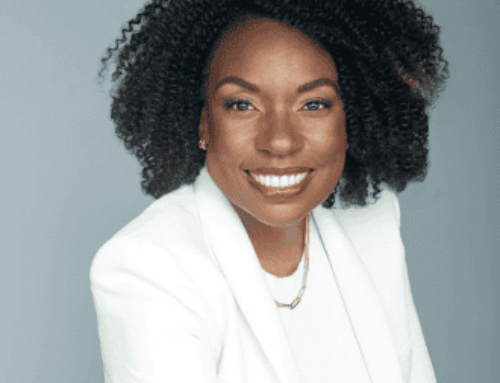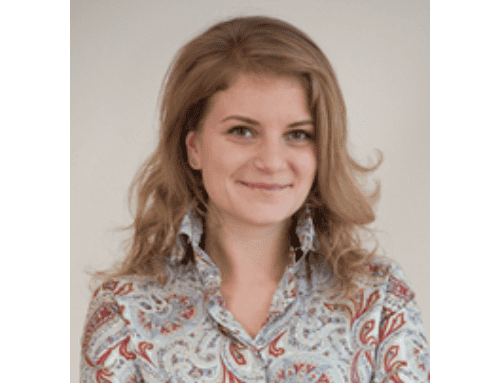With Lindsay Jones, a reporter based in Halifax for The Globe and Mail. Earlier this year, she won the prestigious Landsberg Award, presented by the Canadian Women’s Foundation and the Canadian Journalism Foundation. She won for a body of work that investigated stories of a sexual assault and abuse of power of police officers, sex worker rights, and online bullying and identity theft. She has written for Wired, The Walrus, Chatelaine, The Atavist and Maclean’s. Her 2023 story Who’s Going to Believe Me published in The Walrus won a National Magazine Award in investigative reporting, and that same year, her in-depth feature that revealed a switched at birth case in Manitoba was a National Newspaper Award finalist.
A note about content: this episode addresses gender-based violence.
Transcript
00:00:01 Andrea
Hello and welcome to Alright, Now What? I’m your host, Andrea Gunraj from the Canadian Women’s Foundation.
Gender equality and justice where we live, work, learn, and play is the goal. And it makes life better for everyone. This podcast is our chance to connect with insightful people and explore what it’ll take to get there in Canada.
The work of the Canadian Women’s Foundation and our partners takes place on traditional First Nations, Métis, and Inuit territories. We are grateful for the opportunity to meet and work on this land. However, we recognize that land acknowledgments are not enough. We need to pursue truth, reconciliation, decolonization, and allyship in an ongoing effort to make right with all our relations.
00:00:47 Andrea
In this episode, I’m interviewing Lindsay Jones, a reporter based in Halifax for The Globe and Mail.
Earlier this year, she won the prestigious Landsberg Award, presented by the Canadian Women’s Foundation and the Canadian Journalism Foundation.
Lindsay has written for Wired, The Walrus, Chatelaine, The Atavist, and Maclean’s. In 2023, she won a National Magazine Award in investigative reporting, and that same year, her in-depth feature on a switched at birth case in Manitoba was a National Newspaper Award finalist.
A note about content: this episode addresses gender-based violence.
I start off by asking Lindsay to do the “gender equality changemaker quiz” we launched earlier this year as a part of our new Count Me In initiative for a gender equal Canada. Please check it out yourself at yescountmein.ca.
00:01:43 Lindsay
Well, apparently I’m a Challenger, which I guess rings true. I’m apparently known to roll up my sleeves and get active and hit the streets in protest and while I don’t do that per se, I feel like I do that a bit in my writing, or I definitely think about issues that matter to me.
And I don’t often go in search of someone that represents those issues. But oftentimes—I’ve been doing this for a little while—women come to me or I see another story, I see how another journalist wrote about something, and I decide I’m going to take that story and maybe think about it in a new way, through a gender-based lens perhaps, and start asking some questions that I think are relevant to someone’s experience.
And so, I guess that’s how I’m a Challenger—challenging the status quo through women’s stories and women’s voices.
00:02:44 Andrea
Well, I’m really curious, I mean, so many people I talk to, they get so surprised at their answers, but it sounds like it’s just right on point for you.
This is always a part of our experience, is that what we bring today, the kind of person we are today, is because we’ve learned lessons in the past. So, let me ask you: what kind of core life lessons do you bring to the project of speaking about gender equality in the media today?
00:03:07 Lindsay
The biggest thing for me is the power of storytelling, and I’ve always been really influenced by that from a young age. That’s how I identify with the world and other people.
As a woman, you know, I can’t discount my own experiences and how I walk through the world, how I see my sisters, my mother, my daughter now. So, of course I bring that point of view as a woman, which I can’t really separate from my work.
But I just—I’ve always believed storytelling is really powerful and, you know, giving women a voice in a place where their experience can be heard and validated in a piece of journalism, while looking at, critically, at the structures of society around that. That is just—that’s like to me what I want to be doing with every story. And it’s the core of what I do and what I hope to keep doing in the future.
00:04:07 Andrea
I’ve heard people say, “human beings are wired for story.” Of course, story is the way that we get into issues and of course, story is the way that we relate to one another and see maybe what needs to change—narratives of change.
But I’m curious, sometimes we look at story, you know, fictional stories, and make this big line between fiction and nonfiction.
Tell me more about that story process. You’re a journalist. How does story work for you? It’s not just the facts, ma’am. It’s—there’s more to it. Tell us a bit about that.
00:04:42 Lindsay
For me, it’s really understanding the place where somebody’s coming from—how they see the world. Like, just spending as much time as I can with someone to try and get a sense of their interior.
I think that that as a journalist, having—you know, I would hope we all have empathy, but to take it to that next level of empathy is to really try to relay that experience of someone’s interior and what they’re going through and what their challenges are in the world. And make it real. Like, create the scene of where they were in time and in place. And all of that is really important to me because it makes it real, and it makes people understand, and perhaps makes it more important.
00:05:33 Andrea
Of course, you’re speaking to really important issues today, and that’s where the Landsberg Award win came in. I was so pleased to see you walk upon that stage and accept this award for excellence in feminist journalism.
Share with us what the stories were about that won this wonderful award. And tell us a little bit more about the experience of getting this win. What did that mean to you? What does it mean to journalism, even to have this award?
00:06:01 Lindsay
I am so thankful to have this—to get the Landsberg award. I mean the women, the journalists who’ve been nominated for it and who have received it in the past are all peers, women whose work I admire. And, I mean, I really hope that it enables me to do more of this work, because this is what’s really important to me.
And so, there were three pieces of work that were part of the Landsberg win.
You know, there’s one story in that group that I worked on I think the longest and the hardest. And that was a Walrus story called “Who’s Going to Believe Me?” And it was about a young woman in St. John’s, Newfoundland, who was out on the town one night drinking and she takes a ride home from a cop late at night. At her apartment, he rapes her.
I live in the Atlantic region of Canada, and in Halifax specifically, but I was reading about this case, and I was just so angry, like what kind of world do we live in where this could happen? I mean, it happens all the time, unfortunately, but there was just something about this case that was just—I started following it, I attended the sentencing. I wasn’t sure who I was writing for yet.
The case went through three trials and, over what became a third of the survivor’s life, it galvanized the city. And her story helped reveal a systemic problem of on-the-job sexual assaults involving uniformed Royal Newfoundland Constabulary officers.
It went all the way to the Supreme Court on Appeal, which was denied and affirmed to the interpretation of position of power and consent involving police officers.
And so, this story was told from the young woman’s point of view, the survivor’s point of view, and this was the first time that she had spoken to a reporter.
That was, that was—she didn’t need a lot of convincing. She actually wanted somebody from outside the media pool that had been covering the case and to look at it from her point of view. And so, I really lucked out in that regard. She trusted me.
So, my approach was to tell it through her lens and give her that power.
It was obviously fact-checked, of course, and in and out of it was based on conjecture or opinion, but her point of view and the people who believed her. It included analysis and research from academics who study sexual assault cases and it looked at how survivors, how women who come forward, are treated in the court system.
What stood out for me, amongst all of that, was her story, was her being able to share her experience of what she went through. And then, you know, the experiences of others who faced, you know, sexual misconduct from police officers, but chose to deal with it in a different way and how they came across Jane Doe and chose to support her.
I also wrote for Wired magazine about a young woman named Trixie Watt. And, I also lucked out with her because she came to me and, you know, found me as somebody who she thought could help tell her story.
It really centered around a perverse situation which, you know, more and more women, LGBTQ, women of colour, are facing today: creating fake profiles on social media and, like, online cyber bullying.
And so, profiles of her were created on these fetish social media sites. Someone was pretending to be her, using her photo and details of where she works. She happened to be a registered massage therapist and a college instructor. She started receiving the most sexually violent messages from men who were under the impression they could come to her workplace and rape her.
On its surface, like OK, this story is very salacious, I guess. But then her story, her uphill battle and getting the RCMP to take it seriously was another thing. That her journey was the story and how she essentially had to investigate these crimes against herself—found other victims, found this perpetrator had a past for 10 years of doing this. And brought it to court and he was successfully prosecuted.
So, the story really shed light on this ambivalence, this reluctance from police to take cyber violence against women seriously in society. In her case, police didn’t know the law. They didn’t know the investigative tools they had. To me, that story was important because it raised a lot of those issues. And this is, you know, something that—it’s becoming an increasingly common type of violence against women that perhaps not a lot of people, clearly the police didn’t know about.
There’s also the case of Brogan Sheehan and she is a sex worker in Halifax who won her right to be paid after taking a John to small claims court. And I wrote about her case in the Globe and Mail, which, you know, some of my older colleagues, older male colleagues, perhaps teased me about—did tease me about.
It’s a serious story in that her victory cleared the way for other sex workers to seek legal remedy when clients refuse to pay. Her advocates believe this was groundbreaking for sex workers in Canada, because it’s a bit of a murky area law where purchasing sexual services is illegal but selling sex by a single sex worker is not.
Today, sex workers have recourse. They have access to the courts for unpaid services, like any other small business owner.
And so, those were the three stories that that went into my nomination for the Landsberg Award.
00:12:01 Andrea
You’re speaking to some themes about legal access, the criminal system, policing, prosecution in prison, as well as [the] economic side of how law intersects.
And I’m curious as to, you know, how you ended up looking at these legal-related cases? Is that something that’s a focus for you? Or is it just that this is where a lot of the stories are?
00:12:28 Lindsay
I feel like this is—for me, this is where a lot of the stories are. When I hear about a case or someone’s story, I’m always trying to look at it through the lens of the systems and society that we live in.
For instance, in the Wired story, only through getting the police records of all of the women who’d gone to police before Trixie Watt, did I understand the ambivalence and how women are dismissed and not taken seriously by police.
It’s hearing a story and then sort of building curiosity around that that helps reveal attitudes about society.
00:13:06 Andrea
Is there a dream story you would like to write on? Is there a dream topic you’d like to do something on?
00:13:17 Lindsay
I’m working on a story that I feel really passionate about right now. It’s a case about intimate partner violence.
That’s something that I care a lot about. I live in Nova Scotia, as I mentioned, which is where we had the largest mass shooting in Canadian history that was directly related to intimate partner violence. And in that case, you know, police had given a pass to the perpetrator many times over and over, despite complaints made against him.
That’s a story I can’t let go of.
And so, I think there’s so much to be done about intimate partner violence and I’m working on a story right now. It’s a narrative about a case in New Brunswick that’s unsolved. I really hope that it, that it comes together as I imagine it to be.
00:14:09 Andrea
One of the things that I’ve been reflecting on is without feminist reporters and challenging reporters, reporters who want to challenge the status quo, I don’t think we would be as far as we are on intimate partner violence. And heavens knows we need to do so much more, as you said. We are at an epidemic level of intimate partner violence in Canada.
And I really look to voices like yours, reportage like yours, to bring those hidden stories and elevate it so we raise our voices to say, “did you see what that story said? This is what we have to do.” So, my great and deep thanks to you as somebody who also really thinks it’s ridiculous that we haven’t ended gender-based violence today, 2024.
I would love to hear your thoughts: what’s a powerful take away you can share to our listeners based on your expertise? What would you say from all you’ve seen in your work— you’ve seen a lot of things, you ask a lot of questions, you’re curious. How can we become better gender equality change makers, no matter who we are?
00:15:13 Lindsay
I think it’s really important to keep amplifying women’s voices, their experiences and their stories—and the Landsberg award, and, and the Canadian Women’s Foundation really helps and supports female journalist to do that.
After the award ceremony, a former top male editor at one of the biggest newspapers came up to me and he said, “I hope someday there isn’t a need for a Landsberg award anymore.” And it was a wishful thought, and I think he said it as a supportive gesture. But I thought about it afterwards and I thought, you know, there will always be vulnerable people in society whose stories need to be told and the women and girls are often the ones—are almost always the ones—facing the greatest disparities.
I believe that there needs to be more support and I will always be in support of writing and reporting stories on gender-based issues.
00:16:18 Andrea
Alright, Now What?
If you want to make sure no woman, girl, Two Spirit, trans, or nonbinary person feels out of options, out of sight, out of time, or out of mind, visit yescountmein.ca today. When you count yourself in, you’ll join over 71,000 people in the Canadian Women’s Foundation’s generous and active community. You’ll get tools and opportunities to advance gender equality. This movement needs you. Visit yescountmein.ca and count yourself in today.
Please listen, subscribe, rate, and review this podcast. If you appreciate this content, please consider becoming a monthly donor to the Canadian Women’s Foundation. People like you will make the goal of gender justice a reality. Visit canadianwomen.org to give today and thank you for your tireless support.






